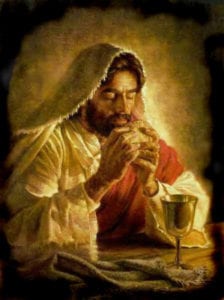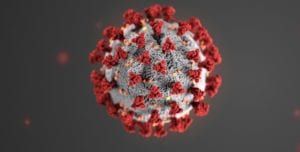
The Bread of Life
The clearest expression of the doctrine of the Real Presence of Christ in the Eucharist is found in chapter 6 of John’s Gospel. There, Jesus teaches the crowd about the Eucharist – His very own Body and Blood. Jesus also teaches the crowd about faith – the unique and special faith needed to accept His difficult teaching about the Eucharist. Many of Jesus’ disciples lacked the faith to believe in the Real Presence. When Jesus walked on the earth, it took great faith for people to believe that Jesus was the Son of God since His humanity veiled His divinity. However, to believe that Jesus is present in the Eucharist requires even greater faith, because the Eucharist veils both His humanity and His divinity.
Jesus’ teaching on the Eucharist comes after the miracle of the multiplication of the loaves. There, Jesus miraculously turned five loaves and two fish into an inexhaustible amount of food, which was enough to feed five thousand men, not counting the women and children, and still fill twelve baskets with leftovers. The miracle of the loaves prefigured the inexhaustible gift of Christ’s own flesh and Blood, which is being received by millions of people in the Eucharist. The miracle of the loaves is nothing compared to the miracle of the Eucharist.
Many people think that when Jesus called Himself the Bread of Life (John 6:48), He was merely saying that He will nourish us spiritually. However, Jesus clearly says that “the bread that I will give is my flesh for the life of the world.” (John 6:51) Jesus clearly teaches us that we must consume His flesh and His Blood as food. Everyone who heard Jesus speak understood Him to be speaking literally of His own Body and Blood. Therefore, the crowd quarreled among themselves, “How can this man give us His flesh to eat?” (John 6:52) Even Jesus’ disciples admitted, “This saying is hard; who can accept it?” (John 6:60) Even after the crowd and His disciples expressed their doubt and disbelief, Jesus never took back what He said. Rather, He continued on to say, “For this reason I have told you that no one can come to me unless it is granted him by my Father.” (John 6:65) As a result of this, many of His disciples returned to their former way of life and no longer accompanied him.
Chapter 6 of John’s Gospel confirms the account of the Last Supper found in the other three Gospels. There, Jesus uses the words: “This is my Body… This is my Blood.” (Matthew 26:26,28; Mark 14:22,24; Luke 22:19,20) St. Paul teaches the tradition of receiving the Eucharist in faith and repeats Christ’s words of Institution: “For I received from the Lord what I also handed on to you, that the Lord Jesus, on the night he was handed over, took bread, and, after he had given thanks, broke it and said: ‘This is my body that is for you. Do this in remembrance of me.’ In the same way also the cup, after supper, saying, ‘This cup is the new covenant in my blood. Do this, as often as you drink it, in remembrance of me.’ For as often as you eat this bread and drink the cup, you proclaim the death of the Lord until he comes.” (1Corinthians 11:23-26)
The Eucharist unites us to Jesus Christ. Jesus said, “Whoever eats my flesh and drinks my blood remains in me and I in him.” (John 6:56) Receiving the Eucharist in faith preserves and increases the life of grace in our souls; we grow in virtue and in the gifts of the Holy Spirit. The Eucharist also cures the diseases of the soul by wiping away venial sins. Because the Eucharist enables us to remain in Christ and Christ to remain in us, we are able to follow Christ more closely. Finally, the Eucharist is Jesus’ promise of everlasting life and the future resurrection of the body; He said, “Whoever eats my flesh and drinks my blood has eternal life, and I will raise him on the last day.” (John 6:54)

Updates to Archdiocesan Directives:
- The dispensation from obligatory weekend Mass attendance remains in effect until June 28. It will likely be extended beyond that time for those who are ill in any way, are hesitant to attend because of the danger of infection, or those who are quarantined because of recent exposure to the coronavirus. Catholics in good health who are not in the categories just listed are encouraged to resume weekend Mass attendance and to follow designated parish procedures.
- Parishes may have gatherings of up to 25 persons at a meeting or class, provided that the distancing requirements can be met and masks worn. (In light of the updated directives from the Archdiocese, we will consider the resumption of bible study classes based on how many participants will attend.)

At the Holy Name of Jesus Chinese Catholic Mission, we do our best to keep you safe when you come to church by spraying the sanctuary and chapel after every Mass with disinfectant, and any room that have been used. We thank you for your continued support and cooperation by wearing masks to church and maintaining social distancing. Hand sanitizers and disinfectant wipes are always available for your use.